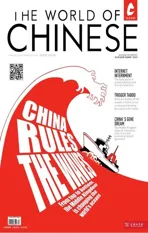ON THE CHARACTER
2014-02-27
ON THE CHARACTER
Bringing out the foreigner in all of us
有一天, 陆地上的中国人发现了另一个世界
Humans are inherently egocentric, and we all like to think of ourselves as the center of the world. The ancient Chinese believed they were in the center of all lands, hence the name “Middle Kingdom”. To them, oceans were the def i nitive boundaries of the world as they knew it, and that's why they also refer to anywhere within the country as “within the sea” or海内(hǎinèi). However, their world expanded with the arrival of the “ocean people” (洋人yángrén, foreigner) from overseas (海外hǎiwài). Ever since, the seas and oceans have forever been tied to the concept of“foreign”.
In the beginning, the character洋(yáng) was simply the name of a particular river. Its early form in seal script showed its left radical氵as a fl owing body of water, representing its meaning. Its right radical羊(yáng, lamb), on the other hand, stood for its pronunciation. It must have been a particular aff l uent river, as洋took on the meaning, “grand” and “rich”.
The pervasive fl oods in myths and legends across all cultures has its equal in China as well, appearing in areport to the Emperor in the West Han Dynasty (206 B.C.E.-25 C.E.) by the collator of the ancient geography bookClassic of Mountains and Seas(《山海经》Shānhǎi Jīng): “In the old days, a fl ood covered every corner of the country.” (昔洪水洋溢,漫衍中国。Xī hóngshuǐ yángyì, mànyǎn Zhōngguó.) As such,洋溢(yángyì) was used to describe the grand scale of the fl ood. When洋took on the meaning of “grand” or “rich”, it often appears in doubles, such as洋洋. For instance, the verse “河水洋洋” (héshuǐ yángyáng) inClassic of Poetry(《诗经》Shījīng) means: “The Yellow River was wide and aff l uent.” It doesn't stop at describing fl oods or rivers;洋洋万言(yángyáng wànyán) also describes a long text with thousands and thousands of words.洋洋洒洒(yángyáng sǎsǎ) is to say a text is copiously large and fl ows well, and along those lines,洋洋大观(yángyáng dàguān) means “a spectacle of a variety of things”.
Besides “rich, grand, and aff l uent”,洋洋also describes the state of being extremely happy and satisf i ed, such as in洋洋得意(yángyáng déyì) and喜气洋洋(xǐqì yángyáng). Such meaning is also passed down from the days of ancient China: in the immortal 11th century essay “Memoir at Yueyang Tower” (《岳阳楼记》Yuèyángluó Jì), a poet wrote, “On the tower, how happy it is to hold a cup of wine and enjoy the gentle breeze and the grand view of Dongting Lake. ” (把酒临风,其喜洋洋者矣。Bǎ jiǔ lín fēng, qí xǐ yángyáng zhě yǐ.)
Nevertheless, the core meaning of洋retains its wet connotation, and when combined with海(hǎi, sea), the character is used to indicate the largest bodies of water on earth, ocean, or海洋(hǎiyáng). The Pacif i c Ocean is太平洋(Tàipíng Yáng), the Indian Ocean is印度洋(Yìndù Yáng), the Atlantic Ocean is大西洋(Dàxī Yáng), and the Arctic Ocean is北冰洋(Běibīng Yáng).
Along with the “ocean people” came a wide variety of novelties never before seen on the mainland, and as such, people conveniently added洋to each one of them to indicate their origin. Foreign language was洋文(yángwén), and the Western suit was called洋服(yángfú) at fi rst, although西服(xīfú, Western attire) is more widely used today. If you studied abroad, it was called留洋(liúyáng, literally, “to stay in the ocean”). All foreign products are naturally洋货(yánghuò, ocean goods). At this point, creating new words was straight forward, just keep adding洋: a match was called “ocean fi re”, or洋火(yánghuǒ) and cement was “ocean dust”, or洋灰(yánghuī). Many of these “ocean” words are still in use today, such as “ocean scallion” or洋葱(yángcōng, onion) and “ocean babies” or洋娃娃(yángwáwa, dolls).
Fashion and modernity also reached across the sea, giving rise to the word洋气(yángqi). Literally “foreign air”; it means“outlandish or stylish”. Besides admiration for the early foreigners, some curious spectators had a hard time understanding cultural differences. The word出洋相(chū yángxiàng) literally means “to display foreign looks”, which means “to cut a sorry fi gure”.
As the phrase崇洋媚外(chóng yáng mèi wài, worship things foreign and fawn on foreigners) suggests, admiration of foreigners is to be entirely condemned. Even the word洋化(yánghuà, adapting to the foreign way of life) has a certain sting to it. Some believe the foreign ideas only provide a means to a Chinese end, such as in the phrase洋为中用(yáng wéi zhōng yòng) suggests: “to absorb what's benef i cial for China from foreign culture”.
In opposition to the ocean, we have earth, which is土(tǔ). It means “native, indigenous, unref i ned, crude, and rustic”, the opposite of洋. It seems no one wants to stay土, yet adapting to the洋would be entirely unacceptable, either. The obvious solution? Just add some “Chinese characteristics” and the problem will be solved in no time.
- HUANG WElJlA (黄伟嘉) AND llU JUE (刘珏)


